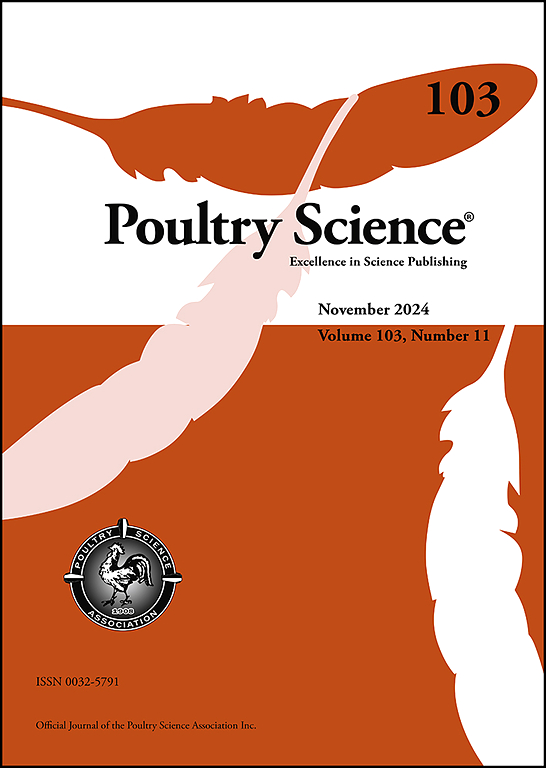Genome-wide association study to identify biological and metabolic pathways associated with carcass portion weights in turkeys
IF 3.8
1区 农林科学
Q1 AGRICULTURE, DAIRY & ANIMAL SCIENCE
引用次数: 0
Abstract
The application of genetic and genomic improvement strategies in the poultry industry has been widely successful at improving meat yield and efficiency, however some challenges persist. As demand for larger and leaner birds increases, we have not fully assessed how selection for growth affects various carcass portions. The objective of this study was to conduct a genome wide association study (GWAS) and functional analysis on turkey carcass portion weights. Phenotypic data consisted of carcass portion weights (fillets, tenders, drums, thighs) obtained at processing (N = 646 – 1,478). Genotypic records were available from a proprietary 65 K single nucleotide polymorphism (SNP) chip. A linear mixed model was used to estimate SNP effects and a 30-SNP sliding window approach was used. Across all traits, 14 functional candidate genes (FCGs) were identified, and these were predominately associated with protein metabolism and immune function. Interestingly, carcass portions did not share FCGs, except for the thighs and drums, which shared one functional candidate gene (PDGFB). These results add to the understanding of the genetic architecture of carcass portion weights, and this could be applied in a turkey breeding program.
全基因组关联研究,以确定与火鸡胴体部分重量相关的生物学和代谢途径
遗传和基因组改良策略在家禽业中的应用在提高肉类产量和效率方面取得了广泛的成功,但仍存在一些挑战。随着对更大和更瘦的鸟类需求的增加,我们还没有完全评估生长选择如何影响不同的胴体部分。本研究的目的是对火鸡胴体部分重进行全基因组关联研究(GWAS)和功能分析。表型数据包括加工时获得的胴体部分重量(鱼片、嫩肉、鼓肉、大腿)(N = 646 - 1478)。基因型记录可从专利的65 K单核苷酸多态性(SNP)芯片获得。使用线性混合模型估计SNP效应,并使用30-SNP滑动窗口方法。在所有性状中,鉴定出14个功能候选基因(FCGs),这些基因主要与蛋白质代谢和免疫功能相关。有趣的是,胴体部分不共享FCGs,除了大腿和鼓,它们共享一个功能候选基因(PDGFB)。这些结果增加了对胴体部分重量遗传结构的理解,这可以应用于火鸡育种计划。
本文章由计算机程序翻译,如有差异,请以英文原文为准。
求助全文
约1分钟内获得全文
求助全文
来源期刊

Poultry Science
农林科学-奶制品与动物科学
CiteScore
7.60
自引率
15.90%
发文量
0
审稿时长
94 days
期刊介绍:
First self-published in 1921, Poultry Science is an internationally renowned monthly journal, known as the authoritative source for a broad range of poultry information and high-caliber research. The journal plays a pivotal role in the dissemination of preeminent poultry-related knowledge across all disciplines. As of January 2020, Poultry Science will become an Open Access journal with no subscription charges, meaning authors who publish here can make their research immediately, permanently, and freely accessible worldwide while retaining copyright to their work. Papers submitted for publication after October 1, 2019 will be published as Open Access papers.
An international journal, Poultry Science publishes original papers, research notes, symposium papers, and reviews of basic science as applied to poultry. This authoritative source of poultry information is consistently ranked by ISI Impact Factor as one of the top 10 agriculture, dairy and animal science journals to deliver high-caliber research. Currently it is the highest-ranked (by Impact Factor and Eigenfactor) journal dedicated to publishing poultry research. Subject areas include breeding, genetics, education, production, management, environment, health, behavior, welfare, immunology, molecular biology, metabolism, nutrition, physiology, reproduction, processing, and products.
 求助内容:
求助内容: 应助结果提醒方式:
应助结果提醒方式:


